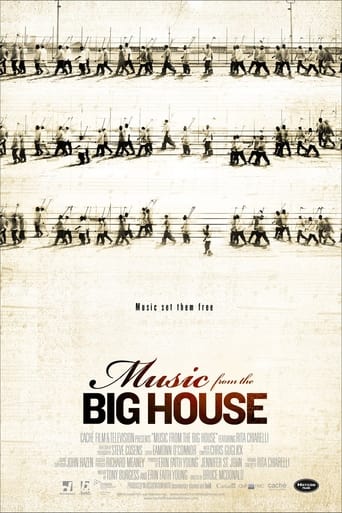



Dreadfully Boring
Although it has its amusing moments, in eneral the plot does not convince.
View MoreStory: It's very simple but honestly that is fine.
One of the film's great tricks is that, for a time, you think it will go down a rabbit hole of unrealistic glorification.
View MoreMusic from the Big House left me with a different point of view of prison life and the inmates within the walls. Rita Chiarelli was fantastic performing the blues with the inmates of Angola Prison. This film was outstanding documentary! I have recently purchased the DVD and it was well worth it! It includes concert extras, bonus scenes, and these four walls stills video! I'm so glad I have the "these four walls" video, absolutely my favorite song in the film. I have never felt so close to people within a documentary. These bonus materials help complete the essence of the movie! I'm so glad I got the DVD for the extras!
View MoreI can only echo what has been stated by majority of reviews here. This movie takes a warm and engaging look at the blues and roots music coming from Angola Prison Louisiana while balancing that with the reality of the men that live behind bars. We don't learn a lot about why the men are doing time, but this adds an ability to empathize without being pushed to judge those same men. The cinematography is beautifully shot and the action paced well, interspersing forward movement with history and biography. Nor does the film avoid the gritty and dismal living conditions at the prison. The music for the men in Angola becomes a much need cathartic and creative outlet. And the music itself is great. Regardless of your musical preferences it would be hard not to find sympathetic joy from seeing the performances. Chirarelli's performances are great and it's apparent from the start that she genuinely cares about the men she performs with. Overall, Music from the Big House is a great story with great music, what else could you want?
View MoreWatching Music from the Big House is like diving into a world that society has long forgotten and chooses not to remember. The black and white exposure of the film gives it an interesting take, reminding the viewer that sometimes life is lived in the gray. It has a particular raw footage grounding effect in part due to its inspirational original music and camera work. It takes you on a journey as if you were seated shotgun during filming. While it's not a story of second chances or new beginnings it reminds us all that life is what you make of it and you must make due with what you have. The film does an extraordinary task of distracting you from the real nature of the individuals being documented, only then to bring you back to a sense of reality right before rolling the credits.
View MoreMusic From the Big House was an incredibly touching film that shows us an aspect of the prison system that is usually overlooked, the talent of the individuals within the prison. All of the individual inmates who get interviewed in the film are very musically gifted. Showing us several different bands that formed within the prison, the final concert that Rita Chiarelli put on with them has varied musical types: Country, Blues, Jazz, and Gospel. Rita acts as a guiding force or narrator as we follow her specific journey into Angola prison. Her unique viewpoint on the prisoners' situation makes any viewer question what is really going on inside these prisons. She makes a great point in saying that "we" on the outside feel like we are unaffected by what goes on inside the prisons, but the pain of those individuals trickles down through their families and friends. But Rita also is sure to keep in mind that there are victims out there who are suffering the loss that these men now hold the guilt for. She feels a strange moral quandary when working with group, for she begins to love them, they are good people. From the viewers perspective we pick up on this as well. With many interview bits jumping in- between the musical numbers, we get to know each character, each person relatively well. The film does a good job of putting us into the shoes an perspective of the Angola prisoners and how they deal with "the knowledge that they are going to die in there." For many men, coming to prison was actually a saving grace that allowed them to leave their foolish youth behind and accept a more compassionate and loving lifestyle through the church. Overall the film leaves you off feeling like, WoW, these are changed people, good people, talented and inspirational individuals living within Angola prison, but then the carpet is pulled out from under you as their violent and malicious crimes are revealed to you. It makes you question whether or not you can forgive people for such horrific crimes, whether people can actually change or not.
View More